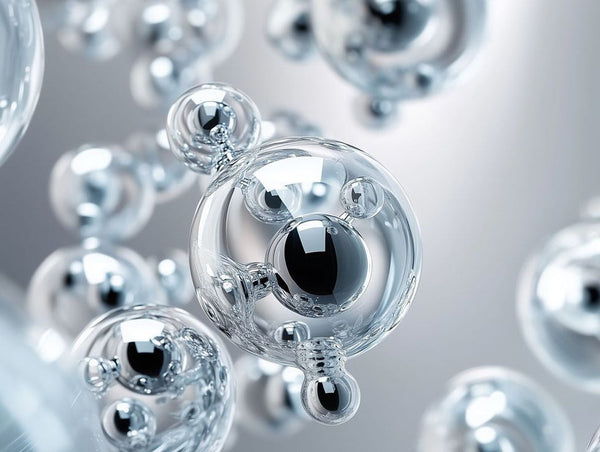If you’ve ever wondered what gives skin that youthful, plump glow, the answer often lies in one key protein: collagen. It’s the body’s natural scaffolding, responsible for keeping our skin firm, smooth, and resilient. But as we age, collagen production begins to slow, leading to visible signs of aging like fine lines and sagging. So, how to boost collagen production in skin and keep our skin looking its best?
Let’s explore ten effective ways to naturally boost collagen production and maintain that healthy glow.
What is Collagen in Skin?
Collagen is a fibrous protein that makes up roughly 75% of our skin’s structure. Think of it as the building block that gives your skin its strength and elasticity. As we get older, collagen production naturally declines, starting as early as around our 20s[NIH].
Environmental factors like UV exposure, smoking, and a poor diet can accelerate this process, leading to wrinkles, loss of firmness, and an overall dull appearance.
The good news? You can take several steps to naturally boost collagen production and keep your skin looking vibrant.
1. Prioritize Vitamin C for Skin Health
If you’re serious about how to improve collagen, start by incorporating more Vitamin C into your routine. This essential vitamin is crucial for collagen synthesis, as it helps convert amino acids into collagen. Foods rich in Vitamin C, such as citrus fruits, strawberries, bell peppers, and kale, not only boost collagen but also protect existing collagen from damage caused by free radicals.
Scientific research confirms that a diet high in Vitamin C is linked to improved collagen synthesis and skin health, reinforcing its role in maintaining a youthful complexion [NIH].
2. Include Protein-Rich Foods in Your Diet
Collagen is made up of amino acids, which are the building blocks of proteins. To naturally boost collagen production, focus on protein-rich foods like eggs, fish, lean meats, beans, and nuts. These provide your body with the essential amino acids needed to build collagen. Complement these with foods high in zinc and copper, which play supportive roles in collagen formation.
3. Embrace Antioxidant-Rich Foods
Antioxidants are your skin’s best defense against oxidative stress, which can break down collagen. Foods like blueberries, green tea, dark chocolate, and spinach are packed with antioxidants that help protect collagen fibers from damage. Green tea, in particular, contains polyphenols that support collagen and help maintain skin elasticity.
4. Consider High-Quality Collagen Supplements
While incorporating collagen-boosting foods into your diet is essential, adding a collagen supplement can provide a significant boost, especially as we age. High-quality supplements made with hydrolyzed collagen peptides are known for their bioavailability, meaning they are broken down into smaller, easily absorbable units. This form of collagen not only stimulates natural collagen production but can also improve skin elasticity, reduce wrinkles, and promote overall skin health.
There have been studies that found that a daily intake of collagen peptides significantly improved skin hydration, elasticity, and smoothness [NIH].
When choosing a supplement, look for one that features Type I and Type III collagen peptides, as these are most effective for skin, hair, and nails. Additionally, opting for supplements that include Vitamin C, hyaluronic acid, and biotin can enhance collagen synthesis and hydration, providing a more comprehensive approach to skin care.
5. Stay Hydrated for Optimal Skin Health
Water helps maintain the skin’s elasticity, making it appear more plump and youthful. By drinking at least 8-10 glasses of water daily, you help support the collagen network in your skin, keeping it moisturized and supple. Dehydrated skin tends to look dull and can exacerbate the appearance of fine lines.
6. Protect Your Skin from the Sun
UV radiation is one of the leading causes of collagen breakdown. Prolonged sun exposure can degrade collagen fibers, making skin lose its firmness and elasticity. Using a broad-spectrum sunscreen with at least SPF 30 every day is an effective way to protect your skin and preserve collagen levels. For added protection, incorporate antioxidant-rich serums and wear hats when spending extended periods outdoors.
7. Incorporate Bone Broth into Your Diet
Bone broth has become a favorite among those seeking to increase collagen production naturally. It’s made by simmering animal bones and connective tissue, releasing collagen, amino acids, and minerals into a rich, nourishing broth. Consuming bone broth regularly can provide your body with the collagen-building nutrients it needs to maintain healthy skin.
8. Use Retinoids in Your Skincare Routine
Retinoids, derived from Vitamin A, are a proven way to boost collagen production topically. They work by speeding up cell turnover and stimulating collagen synthesis, making them effective in reducing the appearance of fine lines and wrinkles. Whether you opt for over-the-counter retinol or prescription-strength retinoids, consistent use can lead to firmer, more youthful-looking skin.
Clinical studies have shown that retinoids can significantly increase collagen production in the skin, making it a staple in many anti-aging skincare routines [NIH].
9. Add Omega-3 Fatty Acids to Your Diet
Omega-3 fatty acids, found in foods like salmon, chia seeds, and walnuts, help strengthen the skin’s natural lipid barrier. This barrier locks in moisture and supports collagen integrity, keeping your skin hydrated and protected. By reducing inflammation, omega-3s also help prevent collagen breakdown, contributing to a smoother, more youthful complexion.
10. Limit Sugar Intake for Better Skin
Sugar isn’t just bad for your waistline; it can also accelerate skin aging through a process called glycation. When sugar binds to collagen fibers, it causes them to stiffen and lose their elasticity, leading to wrinkles and sagging. Cutting back on sugary foods and opting for a balanced diet rich in whole foods can help preserve collagen and keep your skin looking firm and healthy.
The Bottom Line
Understanding how to boost collagen production is key to maintaining a youthful, radiant appearance. By making small yet impactful changes to your diet and skincare routine—like incorporating Vitamin C, antioxidants, and high-quality collagen supplements—you can effectively support your skin’s natural collagen production. Consistency is key, and with regular use, you’ll notice smoother, firmer skin.
Investing in your skin’s health is a long-term commitment. By choosing the right foods and supplements, staying hydrated, and protecting your skin from environmental stressors, you’re giving your body the tools it needs to produce collagen naturally.
Embrace these tips and watch as your skin becomes more resilient, vibrant, and youthful.
FAQs
1. Does collagen make the skin tighter?
Yes, collagen plays a crucial role in maintaining skin firmness and elasticity. It acts as a structural protein that keeps the skin plump and resilient. As collagen levels decline with age, skin may start to sag and develop fine lines. By incorporating collagen-boosting foods, supplements, and skincare ingredients like retinoids and Vitamin C, you can help maintain tighter, more youthful-looking skin.
2. How to improve collagen production in the body?
To improve collagen production naturally, focus on a nutrient-rich diet that includes Vitamin C, protein, and antioxidants. Eating foods like citrus fruits, berries, leafy greens, and lean proteins provides the essential building blocks for collagen synthesis. Staying hydrated, protecting your skin from excessive sun exposure, and incorporating collagen-boosting skincare ingredients like retinoids and peptides can also help enhance collagen production.
3. Are collagen supplements effective?
Yes, collagen supplements have been shown to be effective in improving skin elasticity, hydration, and overall skin health. Hydrolyzed collagen peptides are easily absorbed by the body, stimulating natural collagen production. Studies indicate that regular intake of collagen supplements can reduce wrinkles and improve skin texture over time. For best results, choose a supplement that includes Vitamin C, hyaluronic acid, or biotin to enhance absorption and collagen formation.
4. How can I boost collagen production naturally?
You can naturally boost collagen production by maintaining a healthy diet rich in Vitamin C, protein, and antioxidants. Consuming collagen-boosting foods like bone broth, berries, citrus fruits, and green leafy vegetables can support collagen synthesis. Staying hydrated, avoiding excessive sugar intake, and protecting your skin from UV damage with sunscreen are also key factors. Additionally, incorporating collagen-boosting skincare ingredients like retinoids and peptides can help stimulate collagen production and improve skin health.

























